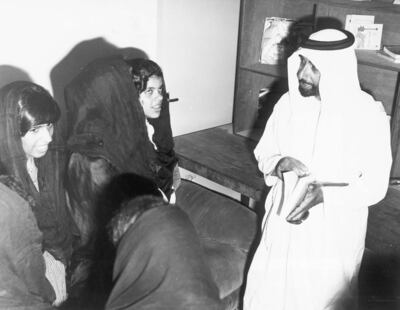In the context of the 50th anniversary of the formation of the UAE, I have been thinking of how far the UAE has come. The evidence of growth is all around us – roads, airports, ports, schools, hospitals and so much else. The country has developed in so many ways, thanks to the efforts of Emiratis and other nationalities.
As Sheikh Zayed, the UAE's Founding Father, said, people are the “real wealth” of the nation. And the nation has come a long way in the past few decades thanks in large part to the education and training for boys and girls alike.

When the UAE was founded, in 1971, there were only a few graduates in the country. All of them were educated overseas. The UAE's first university opened only in 1977 but an early focus on schooling both genders allowed men and women to play a full role in nation building.
Gradually, Emiratis emerged with the skills to take up leading posts in the government and the private sector. From the mid 1970s and in decades that followed, students routinely travelled overseas to study chemical and mechanical engineering.
Over subsequent decades, that investment in education has paid off across industries. The UAE has national airlines but also Emirati pilots trained at home. The health system meets international standards. And the last time I went to visit my dermatologist, I was delighted to find he was Emirati, trained in Paris. Many of our environmental scientists are Emiratis, while in government, the vast majority of employees are UAE citizens.
Over the years, Emiratisation – the endeavour to increase the number of Emiratis in the job market and their contribution to the economy – has been a steady process. The principle that Emiratis should be provided with education so that they can work for the country is well-established.
There is recognition, of course, that the market changes over time. So, 25 years ago, it might not have made much sense for graduates to specialise in space travel. Today, that is certainly a career to which people can aspire. There are other areas too, linked to technological advances of the past few decades, where new job opportunities exist.
There are, however, a host of subjects at university – medieval history, for example – which may not lead to a job that requires that niche knowledge. A history graduate may find few jobs, if any, that need him or her to have an in-depth knowledge about, say, the Middle Ages.
But just by being at university, these students will have learnt to absorb and analyse data. Those skills can be applied across a range of professions. Opportunities for students of Renaissance art or philosophy? Not much demand job wise for their specific fields either, I suspect. But the same could hold true in terms of the value of their skills. In reverse, should future bankers study banking? Or might they be better equipped with a broader education?
A few years ago, I listened to a school principal talking to the cohort of students in their final years of study. He told them what they learnt in their courses was of limited importance as by the time they graduated, things would have moved on so the knowledge gained at school could be obsolete. What was important, he said, was that they learnt how to learn, to analyse and to make use of information.
Conversely, topics that years ago were not pertinent to job requirements have become relevant. A decade or two ago, there wasn’t much demand in the Emirates for museum curators or for conservationists – people with training in the conservation of heritage buildings. Today, the number of job opportunities in those niche areas grows year by year.
When I left university, the degree I had – in international relations – was not relevant to my first job. And so it has continued over the years, as I have changed direction. The skills I learnt while studying though, similar to the ones the school principal talked about, are still relevant.
The process of education, in my view, should be more than a conveyor belt that turns out fresh graduates for the job market. There is more to learning than that – and to life.


